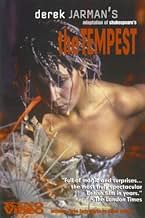IMDb RATING
6.3/10
1.3K
YOUR RATING
Banished to a forsaken island, the Right Duke of Milan and Sorcerer Prospero gets the chance to take his revenge on the King of Naples with the assistance of his airy spirit-servant, Ariel.Banished to a forsaken island, the Right Duke of Milan and Sorcerer Prospero gets the chance to take his revenge on the King of Naples with the assistance of his airy spirit-servant, Ariel.Banished to a forsaken island, the Right Duke of Milan and Sorcerer Prospero gets the chance to take his revenge on the King of Naples with the assistance of his airy spirit-servant, Ariel.
- Director
- Writers
- All cast & crew
- Production, box office & more at IMDbPro
Featured reviews
Into this primordial mix, add some seventeenth century magic, and you have Shakespeare's "The Tempest", a play whose themes are: freedom, temperance, repentance, and forgiveness. The main difference between Shakespeare's play and Derek Jarman's film is, of course, the nearly four hundred years of change in theatrics that separate the two artists.
Jarman's version tries to adhere to the play, in that the film uses quasi-Elizabethan linguistics, which renders the dialogue difficult to understand. The play's intent is still intact in the film, if a little obscured by the language, and is conveyed mostly through the acting and the cinematography, though "adapted" in style to a more contemporary audience. Hence, the film's inventive finale features a vocal rendition of "Stormy Weather", a modern metaphor for a message that spans the ages.
Even with the updated visuals, this film is going to be a bit much for most viewers. It is just too out of sync with what modern audiences expect. On the other hand, for those few who appreciate Shakespeare, the film can be insightful, with the proviso that it is not "pure" (or literal) Shakespeare.
Jarman's version tries to adhere to the play, in that the film uses quasi-Elizabethan linguistics, which renders the dialogue difficult to understand. The play's intent is still intact in the film, if a little obscured by the language, and is conveyed mostly through the acting and the cinematography, though "adapted" in style to a more contemporary audience. Hence, the film's inventive finale features a vocal rendition of "Stormy Weather", a modern metaphor for a message that spans the ages.
Even with the updated visuals, this film is going to be a bit much for most viewers. It is just too out of sync with what modern audiences expect. On the other hand, for those few who appreciate Shakespeare, the film can be insightful, with the proviso that it is not "pure" (or literal) Shakespeare.
Derek Jarman's take on Shakespeare makes it into something of a punk symphony, without sacrificing the heart of the play. His cast are mostly very good especially Heathcote Williams as Prospero, Toyah as Miranda, and Karl Johnson as Ariel and the bits that are added fit in well, especially Elisabeth Welch's appearance singing Stormy Weather'.
Comedy light relief is provided by Ken Campbell and Christopher Biggins as the shipwrecked drunks finding themselves on Prospero's enchanted island, with Jack Birkett as a creepy Caliban.
The film keeps the interest by using the unexpected it may miss the point of the quieter moments of the play but makes up for this by its sheer inventiveness. Even the songs are treated well with Johnson's sharp suited sprite showing a mischievous streak which works perfectly. All this is covered with a queer gloss which informs the play with a new perspective.
Comedy light relief is provided by Ken Campbell and Christopher Biggins as the shipwrecked drunks finding themselves on Prospero's enchanted island, with Jack Birkett as a creepy Caliban.
The film keeps the interest by using the unexpected it may miss the point of the quieter moments of the play but makes up for this by its sheer inventiveness. Even the songs are treated well with Johnson's sharp suited sprite showing a mischievous streak which works perfectly. All this is covered with a queer gloss which informs the play with a new perspective.
"Speak the speech, I pray you, as I pronounc'd it to you, trippingly on the tongue; but if you mouth it, as many of our players do, I had as lief the town-crier spoke my lines."
Those are the directions that Hamlet gives the players on how to perform the Mousetrap. While the rhythms of Elizabethan English are difficult for Americans, they seems to come naturally for British actors, and those here perform it well enough.
The problems with this production arise, as they often do for THE TEMPEST, from the director's efforts to make it visually striking. Because of the magic that lies at the heart of Shakespeare's autumnal work, its gorgeous language has fallen prey to people who think the best way to stage it is to think what Quentin Crisp would sneer at as too camp and turn it up a couple of notches. One Shakespeare in the Park staging required a dozen people to play Ariel, including a Sumo wrestler; and Peter Greenaway's gloss on the play, PROSPERO'S BOOK, is so bad that when I saw it with some friends, I disrupted the occasion by guffawing at the over-the-top images. They show up here, too.
What all these geniuses fail to realize is that the play is a boy-meets-girl story, something Shakespeare wrote several dozen times. At its core is a coming-of-age story for Miranda, an adolescent girl who is old enough to leave her father. She is confronted by various male archetypes before settling on the only boy her own age. The Bard of Avon's message is so normal, that like should marry like, that youth calls to youth and that Show Business is the process of taking these ordinary and important stories and making us pay for them by wrapping them in mystery ... well, so normal that people miss the point.
The play's real magic is the story of Rapunzel and Snow White and all the other fairy tales which Bruno Bettelheim has shredded to show their symbolic content. That and the language. These should be enough for anyone like me, who cares for these things. It's too bad that the people who produced this version either don't care about Shakespeare or think that no normal person will.
Those are the directions that Hamlet gives the players on how to perform the Mousetrap. While the rhythms of Elizabethan English are difficult for Americans, they seems to come naturally for British actors, and those here perform it well enough.
The problems with this production arise, as they often do for THE TEMPEST, from the director's efforts to make it visually striking. Because of the magic that lies at the heart of Shakespeare's autumnal work, its gorgeous language has fallen prey to people who think the best way to stage it is to think what Quentin Crisp would sneer at as too camp and turn it up a couple of notches. One Shakespeare in the Park staging required a dozen people to play Ariel, including a Sumo wrestler; and Peter Greenaway's gloss on the play, PROSPERO'S BOOK, is so bad that when I saw it with some friends, I disrupted the occasion by guffawing at the over-the-top images. They show up here, too.
What all these geniuses fail to realize is that the play is a boy-meets-girl story, something Shakespeare wrote several dozen times. At its core is a coming-of-age story for Miranda, an adolescent girl who is old enough to leave her father. She is confronted by various male archetypes before settling on the only boy her own age. The Bard of Avon's message is so normal, that like should marry like, that youth calls to youth and that Show Business is the process of taking these ordinary and important stories and making us pay for them by wrapping them in mystery ... well, so normal that people miss the point.
The play's real magic is the story of Rapunzel and Snow White and all the other fairy tales which Bruno Bettelheim has shredded to show their symbolic content. That and the language. These should be enough for anyone like me, who cares for these things. It's too bad that the people who produced this version either don't care about Shakespeare or think that no normal person will.
The Tempest has been interpreted in many different ways ranging from more or less traditional views as dealing with Art to more post-modern approaches that like to dissect the play along post-colonial, feminist, gender or deconstructionist lines. The reason why Jarman's version left me fairly cold is that I didn't have a clue what he was on about. What is the underlying vision/idea/concept behind this rendering of Shakespeare? The previous reviewers do not get much further than revenge tragedy, punk show, but surely there is more to it, isn't there? This is not to say that there is no vision here, just that I was hard put to discover it. Be that as it may, there are still things to enjoy. The punk flavour is refreshing and funny. Toyah Wilcox as Miranda and Jack Birkett as Caliban are wonderful. I did not much care about Williams as Prospero ... not enough magic I suppose. The switches between the old monastery/castle and the (very English) world outside can be a little unsettling at times, but I guess that is intentional. All in all, interesting but not quite the success I had hoped it might be (particularly after seeing Jarman's Caravaggio).
I'm amazed that of all the reviews I've looked at nobody seems to have noticed one of the main points of this film, or at least how I saw it. It seems like one big homosexual fantasy, camp clothing, a glorified nude Ferdinand, a definite sexual tension between Ariel and Prospero, and as a final climax, a group of men in tight sailor suits dancing the hornpipe. This whole approach, once you get used to it, provides you with all sorts of fantastic scenes and images. The sight of an innocent Ariel being pulled towards a disgusting nude Sycorax in order to perform "her earthy and abhorr'd commands", is one of the darkest I've ever scene in a Shakespeare film. However by the end of the film I'd grown tired of the style and the final hornpipe dance was just too much to take. Still overall its an interesting interpretation of the play.
Did you know
- TriviaThe role of Prospero was originally intended for an older actor and John Gielgud was approached but declined. It was then offered to Terry-Thomas but his failing health caused him to turn it down. The character was then rewritten as a younger Prospero and Heathcote Williams was cast.
- Quotes
Miranda, his daughter: Oh, how beauteous mankind is. O brave new world that has such people in it!
- Crazy creditsMany Thanks To All Those Who Took An Interest and Especially... and All The Sailors Who Weathered The Storm.
- ConnectionsFeatured in Toyah (1980)
- SoundtracksStormy Weather
Written by Harold Arlen & Ted Koehler
Performed by Stephen Pruslin (as Steven Pruslin) and Dave Campbell
Sung by Elisabeth Welch
Arranged by Stephen Pruslin (as Steven Pruslin)
Produced by Guy Ford
- How long is The Tempest?Powered by Alexa
Details
- Release date
- Country of origin
- Official site
- Language
- Also known as
- Der Sturm - The Tempest
- Filming locations
- Production company
- See more company credits at IMDbPro
Box office
- Budget
- £150,000 (estimated)
- Gross worldwide
- $813
- Runtime
- 1h 35m(95 min)
- Sound mix
- Aspect ratio
- 1.37 : 1
Contribute to this page
Suggest an edit or add missing content





























